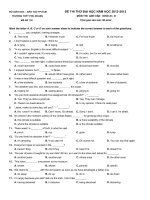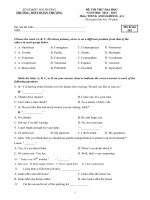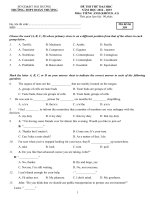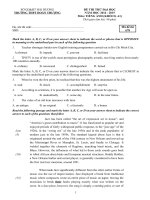- Trang chủ >>
- THPT Quốc Gia >>
- Ngoại Ngữ
Đề thi thử Đại học môn Tiếng Anh trường THPT Phú Nhuận, TP. HCM năm 2014 (lần 2)
Bạn đang xem bản rút gọn của tài liệu. Xem và tải ngay bản đầy đủ của tài liệu tại đây (151.92 KB, 9 trang )
SỞ GIÁO DỤC VÀ ĐÀO TẠO TP.HCM
TRƯỜNG THPT PHÚ NHUẬN
Mã đề thi 157
ĐỀ THI THỬ ĐẠI HỌC – NĂM 2014
MÔN ANH VĂN - KHỐI D, A1
Thời gian làm bài: 90 phút (không kể thời gian phát đề)
Họ ,tên thí sinh:
Số báo danh:
ĐỀ THI GỒM 80 CÂU (TỪ QUESTION 1 ĐẾN QUESTION 80)
Mark the letter A, B, C, or D on your answer sheet to indicate the word whose underlined part
differs from the other three in pronunciation in each of the following questions.
Question 1: A. Wound B. Drought C. Mount D. Sound
Question 2: A. Depth B. Smooth C. Threat D. Teeth
Mark the letter A, B, C, or D on your answer sheet to indicate the word that differs from the
other three in the position of the primary stress in each of the following questions.
Question 3: A. Advertise B. Commerce C. Dance D. Express
Question 4: A. Endangered B. Resolution C. Attempt D. Determine
Question 5: A. Consume B. Proportion C. Conscious D. Empower
Read the following passage and mark the letter A, B, C or D on your answer sheet to choose the
word or phrase that bests fits each of the numbered blanks from 6 to 15.
Modern marriage is in chaos. Most men and women seek a relationship with a member of the
(6) sex and we will have the idea of a (7) partner. But that won’t immunize you
(8) the fact that marriage life is different in the late 20
th
century. Society today no longer has
a clear (9) of what marriage means. Most people would never enter a marriage if they didn’t
think there was (10) mystical in it. The trouble is, we have (11) the romantic notion and
ideal of love. Modern couple talk about marriage as togetherness. Men and women use the same word
but very often they (12) different things and they may want different things. Women want
togetherness in the (13) of doing things together. Men like their wives somewhere for them,
but not necessarily (14) them. The evidence is that such subtle differences are important. If
they are not addressed they can (15) a gulf.
Question 6: A. opposite B. other C. various D. diverse
Question 7: A. complete B. perfect C. absolute D. thorough
Question 8: A. about B. with C. for D. against
Question 9: A. clarification B. notice C. concept D. meaning
Question 10: A. something B. a thing C. nothing D. what
Question 11: A. overestimated B. overplayed C. overstated D. overlooked
Question 12: A. convey B. define C. state D. mean
Question 13: A. sense B. notion C. aim D. purpose
Question 14: A. for B. before C. with D. about
Question 15: A. regenerate B. manufacture C. perform D. produce
Mark the letter A, B, C or D on your answer sheet to indicate the correct answer in each of the
following questions.
Question 16: Advertisers often claim their campaigns at young people as they have considerable
spending
A. power B. force C. energy D. ability
Question 17: The proposed of Micro Industries and SJ Electronics would make the new
company the largest electronics firm in Britain.
A. combination B. fusion C. mixture D. merger
Question 18: They live in a very populated area of Italy.
A. sparsely B. scarcely C. largely D. barely
Question 19: I’m opting out of the race and going to live on a small farm in the countryside.
A. horse B. dog C. rat D. cat and mouse
Question 20: You had better keep a box of matches in case the lights go out again.
A. handy B. by hand C. at your fingertips D. in touch
Question 21: We have to these difficult circumstances.
A. take pride in B. make account for C. take account of D. give way to
Question 22: Their flat is decorated in a combination of colors.
A. tasteful B. sweet C. delicious D. tasty
Question 23: You can’t enter this camp without from the General.
A. a control B. a permit C. a demand D. an allowance
Question 24: There were only two class seats left.
A. economic B. economy C. economical D. economizing
Question 25: The choir stood in four rows according to their heights.
A. respectable B. respective C. respectful D. respected
Question 26: As the evening on, I became more and more bored.
A. passed B. drew C. stuck D. wore
Question 27: All her hard work paid in the end and she’s now very successful.
A. up B. out C. off D. back
Question 28: You can talk to him until you are in the face, but he still won’t understand.
A. white B. green C. yellow D. blue
Question 29: He through with his plan although all his friends advised him to abandon it.
A. went B. gave C. made D. put
Question 30: The boys when they saw the police.
A. ran off B. made off C. gave off D. made out
Question 31: I am going to the party too, so me.
A. look for B. look out for C. keep out for D. give up to
Question 32: He is not awake his opportunities.
A. to B. in C. out D. for
Question 33: He is susceptible deep feeling.
A. about B. of C. with D. into
Question 34: He has been caught in the rain, and has been wet
A. over and over B. once for all C. to and fro D. through and through
Question 35: “Do you like that advanced training course you’re taking, James?”
“ ”
A. No, not everyone B. No, thanks
C. Not me, I’m still waiting D. By and large, yes
Question 36: “Sorry, I’m late Mike.” “ ”
A. Well, it’s worth a try B. Not on my account
C. No, I wouldn’t mind at all D. That’s all right
Question 37: “What a great haircut, Lucy” “ ”
A. You think so? I think it a bit too short
B. It’s my pleasure
C. Oh, yes. That’s right
D. Thanks. It’s very kind of you to do so
Question 38: It is that the plan will fail.
A. likelier B. more likely than C. all likelihood D. more than likely
Question 39: There are paintings on the wall over there.
A. two interesting little red French oil B. two little red interesting oil French
B. little two interesting oil red French D. two oil interesting red little French
Question 40: I’d recommend you to buy the green blouse because it is almost price as the
other one you tried on, but green actually suits you
A. far more / well B. similar / as good
C. as much / the best D. the same / better
Question 41: The project team decided that people they told about their innovative
ideas
A. the more/the best B. the less / the better
C. much more / as well D. the fewer / the better
Question 42: We wouldn’t finish our assignment we stayed up all night.
A. provided B. as long as C. in case D. even if
Question 43: the time change, it will now be getting dark an hour earlier.
A. Despite B. Owing to C. Just as D. Instead of
Question 44: one day by a passing car, the dog never walked properly again.
A. Having injured B. Injuring C. Injured D. To be injured
Question 45: UNICEF stands for
A. United Nation International Children’s Fund
B. United Nation International Children Fund
C. United Nations International Children’s Fund
D. United Nation’s International Children’s Fund
Read the following passage and mark the letter A, B, C or D on your answer sheet to indicate the
correct answer in each of the questions from 46 to 55.
Application for admission to the Graduate School at this university must be made on forms provided by
the Director of Admissions. An applicant whose undergraduate work was done at another institution
should request that two copies of undergraduate transcripts and degrees be sent directly to the Dean of
the Graduate School. Both the application and the transcripts must be on file at least one month prior to
the registration date, and must be accompanied by a non-refundable ten-dollar check or money order to
cover the cost of processing the application.
Students who have already admitted to the graduate School but were not enrolled during the previous
semester should reapply for admission using a special short form available in the office of the Graduate
School. It is not necessary for students who have previously been denied admission to resubmit
transcripts; however, new application forms must accompany all requests for reconsideration.
Applications should be submitted at least eight weeks in advance of the session in which the student
wishes to enroll. Students whose applications are received after the deadline may be considered for
admission as non-degree students, and may enroll for six credits hours. Non degree status must be
change prior to the completion of the first semester of study however.
An undergraduate student of this university who has senior status and is within ten credit hours of
completing all requirements for graduation may register for graduate work with the recommendation of
the chairperson of the department and the approval of the Dean of the Graduate School.
Question 46: What is the author’s main purpose?
A. How to apply to the Graduate School.
B. How to obtain senior status.
C. How to register for graduate coursework.
D. How to make application for graduation.
Question 47: Where would this passage most probably be found?
A. In a university catalog B. In a travel folder
C. In a newspaper D. In a textbook
Question 48: According to the passage, where would a student secure application forms for admission
to the university?
A. From the chairperson of the department.
B. From the Dean of the Graduation School
C. From the institution where the undergraduate work was done.
D. From the director of Admission
Question 49: Which of the following documents must be on file thirty days before the registration day?
A. Two copies of recommendations from former professors.
B. A written approval of the Dean of the Graduate School.
C. One set of transcripts and an English proficiency score.
D. Two copies of undergraduate courses and grades, an application form, and an application fee.
Question 50: The author uses the word ”nonrefundable” in line 6 to refer to:
A. a process B. an application C. a check D. a date
Question 51: The phrase “in advance of” in line 13 is closest in meaning to:
A. into B. on either side of C. after the end of D. prior to
Question 52: The author makes all of the following observations about non-degree students EXCEPT
A. they may be admitted after the deadline.
B. they may enroll for six credits hours.
C. they must change their status during the first semester.
D. they need not submit transcripts.
Question 53: The word “status” in line 16 could best be replaced by which of the following?
A. information B. classification C. payment D. agreement
Question 54: Students who have already been admitted to the Graduate School
A. never need to apply for readmission.
B. must reapply if they have not been registered at the university during the previous semester.
C. must reapply every semester.
D. must reapply when they are within ten credits hours of graduation.
Question 55: What special rule applies to undergraduate students?
A. They may not register for graduate work.
B. They must pass an examination in order to register for graduate work.
C. They may receive special permission to register for graduate work.
D. They may register for graduate work at any time.
Mark the letter A, B, C or D on your answer sheet to indicate the underlined part that needs
correction in each of the following questions.
Question 56: There is an unresolved controversy as to whom is the real author of the
A B C
Elizabethan plays commonly credited to William Shakespeare.
D
Question 57: Methane in wetlands comes from soil bacteria that consumes organic plant matter.
A B C D
Question 58: Artificial sweeteners known as cyclamates banned because of
A B C
evidence that they caused cancer in laboratory rats.
D
Question 59: Historians believe that some forms of advertising must be as old as
A B C
barter and trade.
D
Question 60: Excavations in several mounds and villages on the east bank of the
A
Euphrates River have revealed the city of Nebuchadnezzar, an ancient community that
B
had been laying under later reconstructions of the city of Babylon.
C D
Read the following passage and mark the letter A, B, C or D on your answer sheet to indicate the
correct answer in each of the questions from 61 to 70.
Many of the most flexible examples of tool use in animals come from primates (the group that includes
humans, apes, and monkeys). For example, many wild primates use objects to threaten outsiders. But
there are many examples of tool use by mammals, as well as by birds and other types of animals.
Tools are used by many species in the capture or preparation of food. Chimpanzees use sticks and poles
to bring out ants and termites from their hiding places. Among the most complex tool use observed in
the wild is the use of stones by Ivory Coast chimpanzees to crack nuts open. They select a large flat
stone as an anvil (a heavy block on which to place the nuts) and a smaller stone as a hammer. Stones
suitable for use as anvils are not easy to find, and often a chimpanzee may carry a haul of nuts more
than 40 meters to find a suitable anvil. The use of tools in chimpanzees is especially interesting because
these animals sometimes modify tools to make them better suited for their intended purpose. To make a
twig more effective for digging out termites, for example, a chimp may first strip it of its leaves.
Surprisingly, there is also a species of bird that uses sticks to probe holes in the search for insects. One
of the species of Galapagos finch, the woodpecker finch, picks up or breaks off a twig, cactus spine, or
leaf stem. This primitive tool is then held in the beak and used to probe for insects in holes in trees that
the bird cannot probe directly with its beak. Birds have been seen to carry twigs from the tree to tree
searching for prey.
Tools may also be used for defense. Hermits crabs grab sea anemones with their claws and use them as
weapons to repel their enemies. Studies have demonstrated that these crabs significantly improve their
chances against predators such as octopus by means of this tactic. Also, many species of forest-dwelling
primates defend themselves by throwing objects, including stones, at intruders.
Question 61: What does the passage mainly discuss?
A. Primates are superior to other animals in using tools.
B. The use of stones as tools is similar across different animal species.
C. Birds and primates use tools that are different from those of sea animals.
D. Many animals have developed effective ways of using tools.
Question 62: Why does the author mention ants and termites in the second paragraph?
A. To give an example of food that chimpanzees collect by using tools.
B. To emphasize that ants and termites often hide together in the same place
C. To identify an important part of the chimpanzee diet.
D. To point out a difference between two closely related species.
Question 63: According to the passage, Ivory Coast chimpanzees are among the most remarkable of
animal tool users because they
A. Use tools to gather food B. use more than one tool to accomplish a task
C. transport tools from one place to another D. hide their tools from other animals
Question 64: The word “haul” in the second paragraph is closest in meaning to
A. diet B. type C. load D. branch
Question 65: The word “strip” in the second paragraph is closest in meaning to
A. search B. eat C. carry D. remove
Question 66: The word “probe” in the second paragraph is closest in meaning to
A. change B. watch C. explore D. create
Question 67: According to the passage, what is characteristic of the way in which woodpecker finches
hunt insects?
A. The finches use different plant parts as tools to capture insects.
B. The finches make narrow holes in trees to trap insects.
C. The finches pick up insects that they find on leaves.
D. The finches catch insects in the air as they fly from tree to tree.
Question 68: Which of the following can be inferred from the passage about the behavior of the
woodpecker finch?
A. It uses its beak as a weapon against its enemies.
B. It uses the same twig to look for food in different trees.
C. It uses twigs and leaves to build its nest.
D. It avoids areas where cactus grows.
Question 69: According to the passage, studies have shown that hermit crabs manage to turn octopus
away by
A. attacking the octopus with their claws B. using stones as weapons
C. defending themselves with sea anemones D. hiding under sea plants.
Question 70: Forest primates and certain sea animals are mentioned in the passage as examples of
animals that use tools for
A. self-protection B. food preparation
C. hunting prey D. building nests or home plants grow.
Mark the letter A,B,C or D on your answer sheet to indicate the sentence that is closest in
meaning to the sentence given in each of the following questions.
Question 71: Apparently, Tom and Larry can’t stand an afternoon together without fighting.
A. A fight seems inevitable when Tom and Larry are together even if only for an afternoon.
B. Tom and Larry must have got together in the afternoon to have a fight.
C. Presumably, on the afternoon of the fight, Tom and Larry were together.
D. Unfortunately, Tom and Larry spent the whole afternoon fighting each other.
Question 72: Although they taste nearly the same, both Sprite and Mountain Dew are two
separate citrus-flavored soft drinks made by different companies.
A. Although Sprite has a stronger citrus taste than Mountain Dew, basically they are the same soft
drink, though made by different companies.
B. Sprite and Mountain Dew are both manufactured by the same company, though they are
similarly tasting citrus-flavored soft drinks.
C. Produced by two different companies, Sprite and Mountain Dew, which are both citrus-flavored
soft drinks, taste practically no different.
D. Not made by the same company, Sprite and Mountain Dew are different from one another in the
amount of their citrus flavoring.
Question 73: If the others had taken sensible precautions like we did, this tragedy need never have
happened.
A. If they had not behaved so foolishly, they would not have involved us, either, in this tragedy.
B. The tragedy is that this could have been avoided if only they had all controlled their emotions.
C. If only they would follow our example and behave in a reasonable manner, all this suffering
could be avoided.
D. This tragic outcome could have been avoided, but, unlike us, the rest of them behaved rashly.
Question 74: Owing to the poor visibility it took us ten hours, instead of the usual eight, to get to
London.
A. The lights of London were visible for two hours before we reached the city.
B. Even though we ran into a lot of fog on the way to London the journey didn’t take much longer
than usual.
C. It takes between eight and ten hours to drive to London, depending on visibility.
D. The fog meant that we reached London two hours later than would be normal.
Question 75: People who are unhappy sometimes try to compensate by eating too much.
A. Unhappy people are usually overweight because they tend to eat too much.
B. Eating too much occasionally makes people unhappy and depressed.
C. For some people, eating too much is a reason to be miserable.
D. When depressed, people occasionally attempt to offset their misery by overeating.
Mark the letter A,B,C or D on your answer sheet to indicate the word(s) OPPOSITE in meaning
to the underlined word(s) in each of the following questions.
Question 76: The stereotype that women are submissive is completely false.
A. obedient B. rebellious C. subdued D. docile
Question 77: Some people still think it is impolite for men not to stand up when a woman comes into
the room.
A. chivalrous B. efficacious C. vigorous D. competent
Mark the letter A,B,C or D on your answer sheet to indicate the word(s) CLOSEST in meaning to
the underlined word(s) in each of the following questions.
Question 78: The opposite in parliament accused the government of playing games and refusing to
accept the seriousness of the situation.
A. being light-hearted B. being heavy hearted
C. being down- hearted D. being faint- hearted
Question 79: He accused her of talking through her hat and refused to accept a word of what she said.
A. talking sense B. talking too low C. talking non-sense D. talking tough
Question 80: I think the time has come when you should put your toe in the water at least.
A. go for a swim B. give it a try
C. feel the cold D. give it a chance
The end of the text _ Good luck
ĐÁP ÁN ĐỀ THI THỬ ĐH LẦN 2
MÔN TIẾNG ANH - NĂM 2014 - Mã đề 157
1. A
2. B
3. D
4. B
5. C
6. A
7. B
8. D
9. C
10. A
11. B
12. D
13. A
14. C
15. D
16. A
17. D
18. A
19. C
20. A
21. C
22. A
23. B
24. B
25. B
26. D
27. C
28. D
29. A
30. B
31. B
32. A
33. B
34. D
35 D
36. D
37. A
38. D
39. A
40. D
41. D
42. D
43. B
44. C
45. C
46. A
47. A
48. D
49. D
50. C
51. D
52. D
53. B
54. B
55. C
56. B
57. C
58. C
59. C
60. C
61. D
62. A
63. B
64. D
65. D
66. C
67. A
68. B
69. C
70. B
71. A
72. C
73. D
74. D
75. D
76. B
77. A
78. A
79. C
80. D









